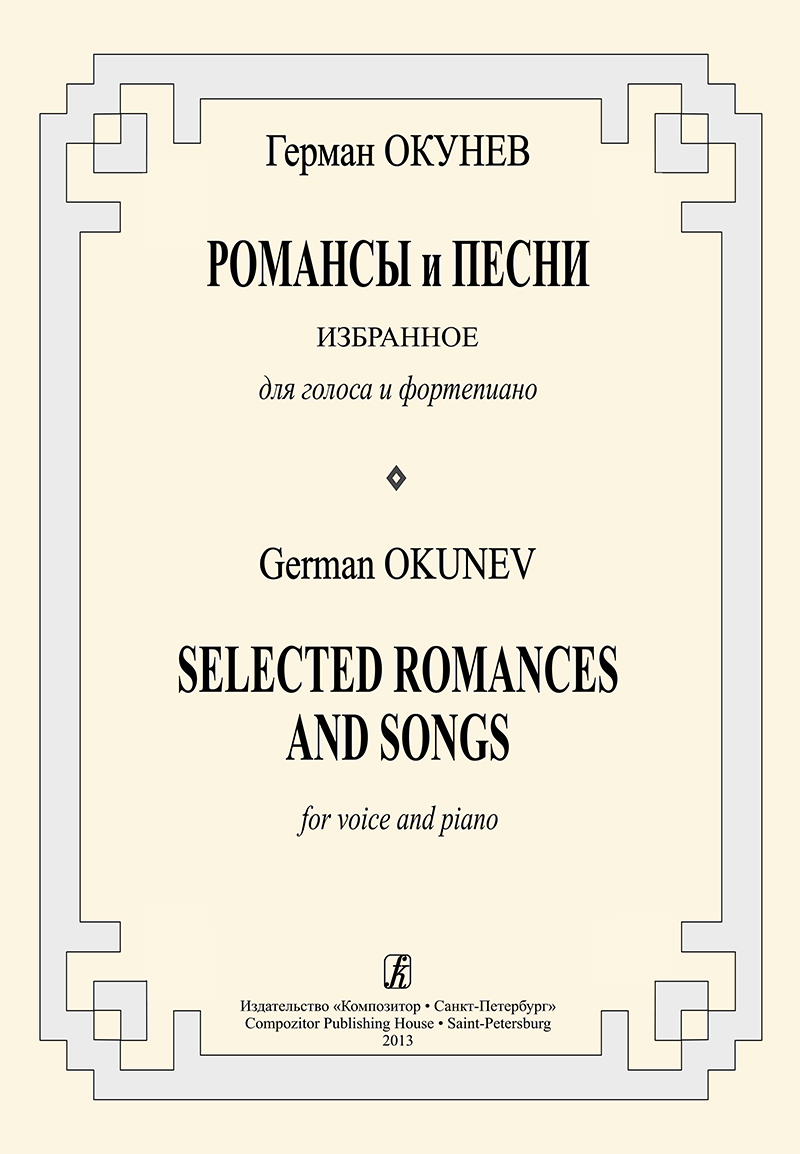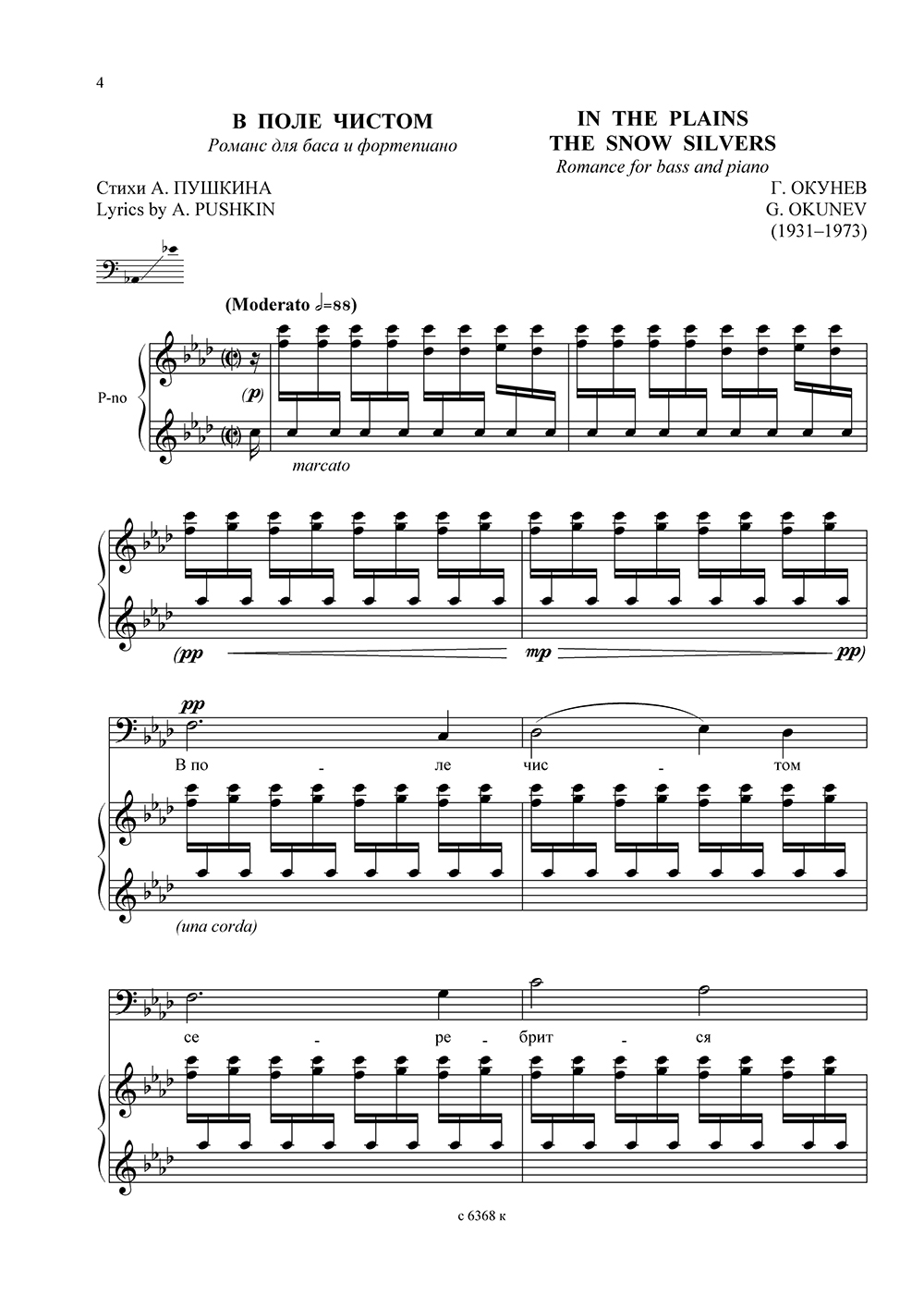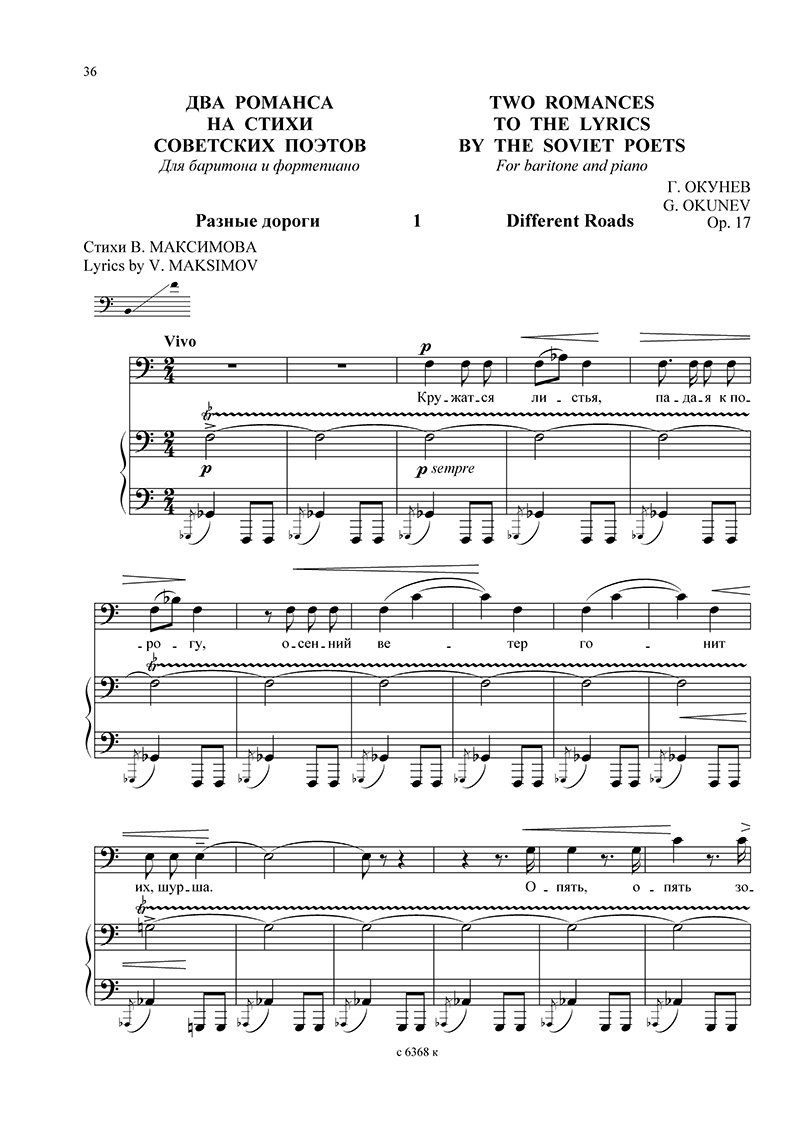
Okunev G. Selected Romances and Songs. For voice and piao
- Author:
- Okunev G.
- Author (full):
- German Okunev
- Title (full):
- Selected Romances and Songs. For voice and piao
- Number of pages:
- 76
The following edition is the first attempt to present a clear picture of the vocal chamber works by St. Petersburg composer German Grigorievich Okunev (1931–1973). With few exceptions, they are largely unknown to musical audiences.
According to Galina Sergeyevna Okuneva, the composer’s widow, her husband did not place vocal chamber music high on his list of compositional priorities. However, performances of these works and research provide evidence of their high artistic value, which enriched the body of mid-to-late twentieth century vocal chamber music as well as the composer’s heritage. Performers of G. Okunev’s vocal compositions concur with this statement, specifically his student Vladislav Pashinsky, a soloist with the Bolshoi Theatre, Eleanor Lyons from the Manchester Opera, and others. The study of G. Okunev’s artistic development also reveals that vocal chamber music was a vital influence in his creative life. His earliest compositions, written while he was a child during the Great Patriotic War in besieged Leningrad, feature several settings of patriotic verses by Soviet poets B. A. Kezhun, V. A. Rozhdestvensky, M. V. Isakovsky, and V. I. Lebedev-Kumach. These songs enjoyed performances in the struggling city, and the young composer received the medal “For the Defense of Leningrad.” Each period of the composer’s short and vivid life contributed to the development of the genre. His last vocal pieces, two children’s songs with lyrics by B. Kozlov, date to 1969.
The final list of his compositions, which German Okunev compiled shortly before his death in 1973, is of particular evidence of the high standard he set for himself and his works as the list appeared to be one opus shorter than the earlier version from 1968. Therefore, the final list featured 39 works instead of the previously listed 40. Despite the composer’s productivity, much of what he had regarded favorably at first, he later ruthlessly and sometimes arbitrarily struck off the list.
The editor has considered the collective body of G. G. Okunev’s compositional works, as our aim is to display the stylistic evolution of the composer’s vocal chamber music. It should be noted that opus numbers and titles are in accordance with the final list, which the editor refers to as List 2 (the previous one — List 1, respectively). The Commentary discusses each composition and identifies its place in both lists. Unfortunately all of the manuscripts of the composer’s chamber vocal works are not currently present in the composer’s archive. In many cases only photocopies remain. Though many manuscripts are unavailable, even the remaining, if incomplete, sources enable us to make conclusions about the importance of G. Okunev’s vocal chamber works, and give insights into his unique compositional process and suggest defendable or near so final versions.
The objective of this edition is to familiarize professional musicians and music lovers with the best of G. G. Okunev’s vocal chamber music and to display his stylistic evolution. Therefore, the collection opens with the romance to A. S. Pushkin’s text: “In the plains the snow silvers” from a youth cycle “Three romances to the lyrics by A. S. Pushkin” written during the composer’s period of study at the N. A. Rimsky-Korsakov Musical College. This edition concludes with the composer’s true masterpiece — a song cycle of five romances to the lyrics by M. I. Tsvetayeva.
The edition is based on manuscripts from G. G. Okunev’s home archive (in the Commentary — Archive), and a few publications of his vocal compositions. In some cases, the editor added performance instructions, which appear in brackets.
We hope that the collection will enrich the pedagogical and concert vocal repertories and that it will provide incentives for further research in both the G. G. Okunev’s vocal style and his works as a whole. It is further hoped this publication will widen the scope of sources on the history of Russian musical culture in the latter half of 20th century. Lastly, it is further intended to preserve the heritage of a remarkable Russian composer who made an important contribution to the development of Russian national music.
Contents:
G. Ovsyankina. On Chamber Vocal Works by German Okunev
IN THE PLAINS THE SNOW SILVERS. Romance for bass and piano. Lyrics by A. Pushkin
ROMANCES. For mezzo-soprano and piano. Op. 7
1. Evening. Lyrics by I. Nikitin
2. Spring came to the Steppes. Lyrics by P. Voron’ko. Translated from Ukrainian by M. Isakovsky
FROST AND WIND… Romance for middle voice and piano. Lyrics by I. Nikitin
STORM. Romance for middle voice and piano. Lyrics by A. Pushkin
I SAW WHILE STANDING AT THE NEVA. Romance for baritone and piano. Lyrics by F. Tyutchev. Op. 10
ADOLESCENCE. Song for high voice and piano. Lyrics by Ye. Galsky
TWO ROMANCES TO THE LYRICS BY THE SOVIET POETS. For baritone and piano. Op. 17
1. Different Roads. Lyrics by V. Maksimov
2. Secular Pines. Lyrics by P. Khalov
VOCAL CYCLE TO THE LYRICS BY M. TSVETAYEVA. For soprano and piano. Op. 25
1. Rowan Tree Is Burning Red
2. In Order That You Mightn’t See Me
3. You Walk, the One Resembling Me
4. Night
5. Sunrise on the Railway
- Author
- Okunev G.
- Author (full)
- German Okunev
- Title (full)
- Selected Romances and Songs. For voice and piao
- Number of pages
- 76


